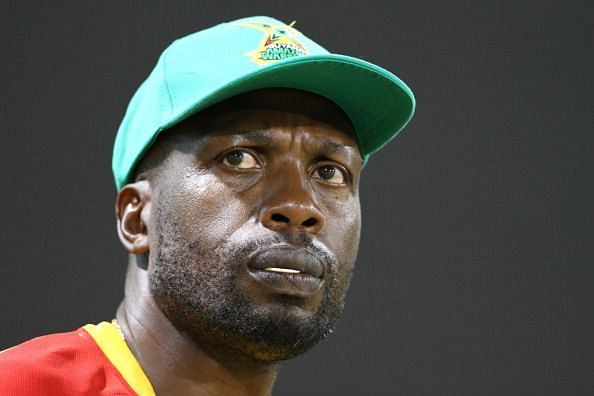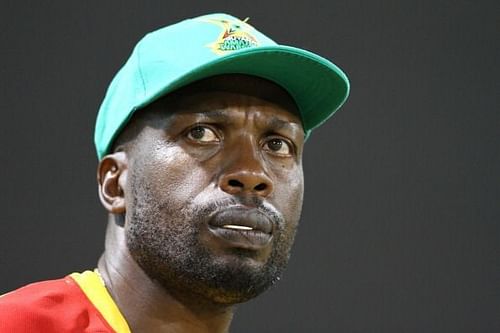
Cricket World Cup history: Curtly Ambrose, the deadly successor to West Indies' pace battery from the 80s

If you are fast and accurate, and also have steepling bounce, you are going to make the life of batsmen miserable. That is just what Curtly Ambrose did. The older he got the straighter he bowled, and more miserly did he become. That is evident from his World Cup figures too.
The bowling average and economy-rate got better and better. The gangling Ambrose got more and more difficult to get away. And he kept taking wickets. Forming a fearsome pair with Courtney Walsh, Ambrose was every batsman's worst nightmare in the 90s.
Successor to Joel Garner, Ambrose’s performances - like his team’s - were modest in the 1992 World Cup, but he could not be faulted for his accuracy. He was hardly ever collared. He took two South African wickets for 34.
He played a significant part in the victory over India, dismissing Sachin Tendulkar and Praveen Amre cheaply and finishing with two for 24 in his 10-over stint.
He had identical figures in another easy win over Sri Lanka. West Indies, however, made an early exit from the event.
It may have been a roller-coaster ride for the West Indies in 1996, but Ambrose produced a stellar performance on unhelpful tracks. The famed Ambrose accuracy was now in full evidence. He rattled the Zimbabweans straight away, dismissing skipper Andy Flower caught behind for three. Later he had Craig Evans also snapped up by Courtney Browne.
Eddo Brandes holed out to Shivnaraine Chanderpaul at long-on. Ambrose bagged three for 28 off his 10 overs. That was enough to win him the man-of-the-match award as the West Indies triumphed easily.
In the next match Ambrose stunned India with two early strikes. He went through the defence of Ajay Jadeja, and repeated the dose on Navjot Sidhu, both scoring one run. That was before a little man named Tendulkar took charge.
As Ambrose took two Kenyan wickets for 21 off 8.3 overs, there was no hint of the disaster that was to follow. The West Indies batsmen capitulated for 93.
It became absolutely necessary to defeat Australia in the last group match in order to qualify for the quarter-finals. Fortunately, skipper Richie Richardson did a star turn. Ambrose was as thrifty as ever, conceding just 25 runs in his 10 overs.
Brian Lara made the quarterfinal his own as the South Africans were upstaged, and Ambrose remained extremely difficult to score off, this time giving away 29 runs in his quota of 10 overs. As a bonus he picked up the early wicket of Gary Kirsten (3), who trod on his stumps.
West Indies were unlikely semi-finalists and Ambrose, aided by Ian Bishop, seemed determined to prove that the form book could be upset again. Ambrose’s first delivery, a boomerang of an in-swinger that curved in a semi-circle into the gloves of Courtney Browne, bore an ominous sign to it.
Sure enough, another sharp in-dipper had the in-form Mark Waugh plumb in front. Soon after, the same fate befell Ricky Ponting. From the other end, Bishop snapped up the wickets of Mark Taylor and Steve Waugh to leave Australia tottering at 15 for four.
That the gritty Aussie batsmen fought back, and the Shane Warne factor came into play late in the match, is another story. Ambrose finished with two for 26 off 10 overs. The West Indies lost by five runs.
Theirs was a strange campaign in 1996, up one moment, down the next, and in which a few stars dazzled momentarily. Ambrose was one consistent performer who nearly carried the side into their first World Cup final in 13 years.
With conditions favourable in England in 1999, Ambrose was invariably on target. He kept the Pakistani batsmen in check, while the Kiwis could take just 19 runs off his 10 overs. Ambrose took a wicket apiece in these matches.
The Scots were completely overwhelmed, being able to score a mere 8 runs from 10 overs as he dismissed two of their top batsmen.
Once again it came down to a match against Australia in order to qualify for the next stage. In an oft-repeated tale over a long time, the West Indies batsmen let the side down once again, being able to muster only 110 runs.
When the Australians batted, Ambrose still seemed to believe that the West Indies could pull off an unlikely win. He induced Mark Waugh to edge one, and Ridley Jacobs took a brilliant catch behind the stumps. Then he had Adam Gilchrist playing a delivery on to his stumps.
Not long after, Darren Lehmann slashed him and was taken superbly by Jimmy Adams at cover-point. But that was all. Australia had been pushed on the back foot at 53 for three, but soon thereafter Ambrose’s quota of overs was exhausted.
He finished with three for 31, going out on a high, even if his team did not. That was his last appearance in the World Cup.
In four matches of the 1999 tournament he took 7 wickets at 13.42 each and an economy rate of 2.35 runs per over. There can scarcely be better figures in one-day cricket.
Ambrose was a professional to the core. Always concentrating on the job at hand, he was not too concerned with the frills of stardom. Ever ready to do battle, he stayed clear of controversies in his long and illustrious career.
Among the tallest fast bowlers in history in more ways than one, he was a fearsome sight. You could never take liberties with Ambrose, perhaps the last in the long line of great modern West Indian fast bowlers - a chain that began with Andy Roberts in the 70s.
Curtly Ambrose’s World Cup bowling and fielding record:
Matches 17, Wickets 24, Average 20.79, Best 3/28, Economy 3.03, Catch 1
Also read – World cup most wickets
Follow Sportskeeda for all the updates on World Cup points table, news, world cup most runs, live scores, schedule, most runs, most wickets and fantasy tips.